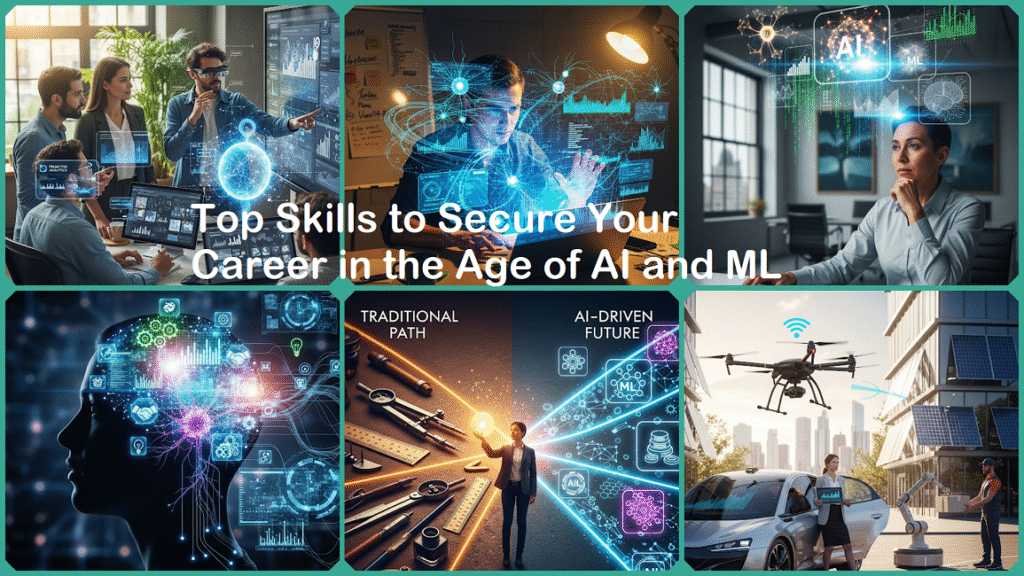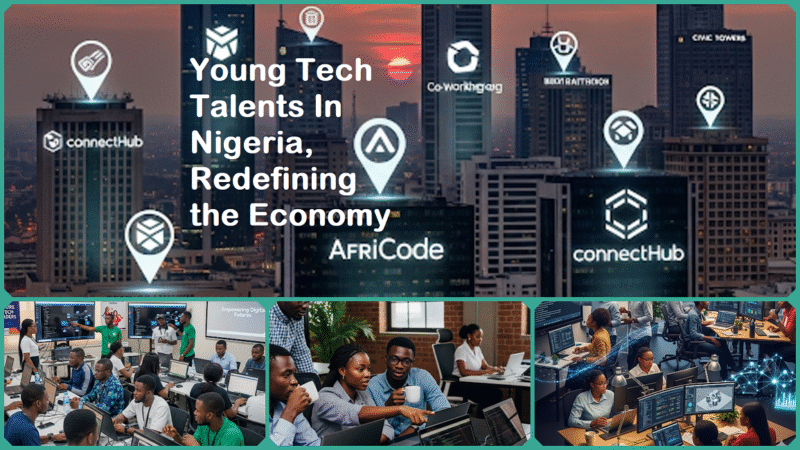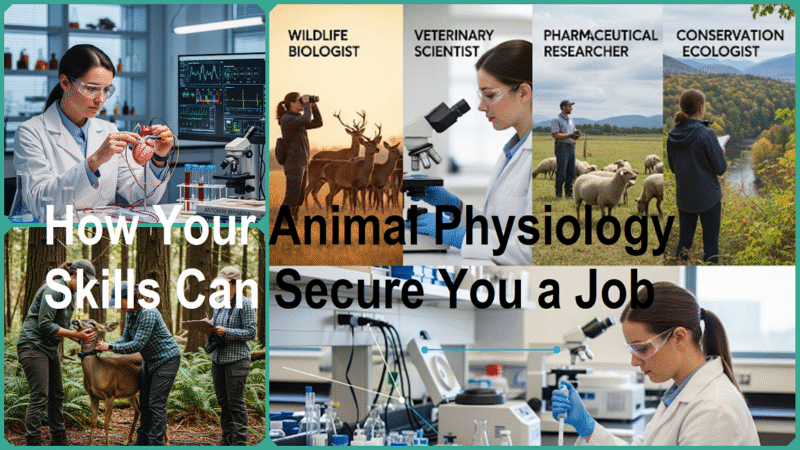Top 13 Skills to Secure Your Career in the Age of AI and ML
Estimated reading time: 14 minutes
In an era when artificial intelligence (AI) and machine learning (ML) are rapidly and profoundly transforming the way workplaces operate, securing one’s career demands much more than just traditional expertise and skills. These cutting-edge technologies are actively reshaping a wide range of industries, including marketing, finance, human resources, and project management, fundamentally altering roles and workflows across the board.
For mid-career professionals, recent graduates, and business leaders alike, deeply understanding and actively acquiring the right skills is absolutely critical to remain relevant, competitive, and well-prepared for the future. In today’s rapidly evolving job market, continuous learning and skill development are essential for maintaining a strong professional edge and successfully navigating changing industry demands.

This article comprehensively outlines the top 13 essential skills designed to help readers successfully transition from a mindset dominated by fear to one of true empowerment. It provides a clear, actionable path that enables individuals to not only adapt but to genuinely thrive and excel in the rapidly evolving, AI-driven future of work.
Understanding AI and ML: Key Concepts and Impact
Artificial Intelligence (AI) refers to systems designed to perform tasks that typically require human intelligence, such as decision-making, speech recognition, and problem-solving. AI aims to create machines that can simulate human cognitive functions, enabling them to operate independently and intelligently in diverse applications.
For example, artificial intelligence powers a wide range of technologies such as virtual assistants, autonomous vehicles, and highly personalized recommendation systems, significantly reshaping the way we live our daily lives and the way we work across various industries and sectors.
Machine Learning (ML) is a crucial subset of AI focused on developing algorithms and models that allow machines to learn patterns from data and improve their performance over time without explicit programming. Unlike traditional software that follows fixed instructions, ML systems generalize from training data to make predictions or decisions on new, unseen data.
This remarkable learning ability serves as the fundamental foundation for a significant portion of modern artificial intelligence’s extraordinary success. It powers a wide array of advanced technologies that have become integral to our daily lives and various industries. Among these technologies are
- Speech recognition systems that can understand and interpret human language
- Sophisticated image identification tools capable of accurately recognizing and categorizing visual data
- Highly effective fraud detection mechanisms that protect financial transactions and personal data
- Complex natural language processing applications that enable machines to comprehend, generate, and respond to human language in a meaningful way
Together, AI and ML automate routine tasks, augment human decision-making, and foster innovation across industries ranging from healthcare and finance to marketing and manufacturing. Instead of replacing jobs, these technologies are changing the nature of work—many roles now blend human insight with AI proficiency, requiring a hybrid of technical and interpersonal skills.
Recognizing and understanding this ongoing evolution is absolutely key to effective strategic upskilling and ensuring long-term career security in the rapidly advancing AI age we are entering today.
Top Skills to Secure Your Career
The top 13 essential skills needed to secure a successful and fulfilling career in the rapidly advancing age of artificial intelligence (AI) and machine learning (ML) combine a diverse blend of technical expertise, human-centric abilities, and strategic understanding.
These skills are crucial for professionals who want to effectively adapt to the continuously evolving and dynamic work landscapes shaped by technological innovation and digital transformation:
Machine Learning and Deep Learning Fundamentals
Experts carefully design and deploy sophisticated predictive models by utilizing a variety of advanced algorithms and powerful frameworks such as TensorFlow or PyTorch. Mastering these technical skills is essential and forms the foundational backbone for effectively applying artificial intelligence across numerous specialized fields, including marketing analytics and financial forecasting.
Professionals who possess these valuable skills often come from a wide range of diverse educational and professional backgrounds, enabling them to build impressive portfolios that may feature innovative projects like intelligent chatbots or highly accurate fraud detection models.
Data Literacy and Data Science
Interpreting and skillfully manipulating data through various advanced statistical analyses and powerful visualization tools, such as Excel, SQL, and Tableau, are crucial elements that significantly drive the overall success of artificial intelligence applications.
Data scientists play a vital role in this process by transforming complex raw data into clear, actionable insights that effectively bridge the gap between specific business needs and the technical capabilities of AI systems.
These highly valuable skills continue to remain in strong demand across a wide range of industry sectors, providing essential support for making well-informed, strategic decisions that can enhance organizational performance and outcomes.
Natural Language Processing (NLP) Knowledge
Understanding Natural Language Processing (NLP) enables the effective leveraging of artificial intelligence (AI) for a wide range of applications, such as chatbots, customer service automation, and sentiment analysis, all of which are crucial components in fields like marketing, human resources, and operational management.
Having a deep knowledge of transformers and advanced language models allows developers and businesses to create sophisticated AI systems that can interact with humans in a natural, human-like manner, significantly enhancing user experience and operational efficiency.
AI and ML Model Auditing and Ethics
As artificial intelligence systems become increasingly widespread and integrated into various aspects of society, it is more important than ever to ensure that these models are transparent, unbiased, and ethically sound.
Professionals who possess the skills to thoroughly audit AI models play a crucial role in enhancing regulatory compliance and building greater trust in decisions driven by AI technologies. Their expertise helps guarantee that AI applications operate fairly and responsibly, promoting confidence among users and stakeholders alike.
Cybersecurity Awareness Related to AIAI opens new vulnerabilities like adversarial attacks. Cybersecurity expertise combined with AI knowledge protects data and models, maintaining organizational integrity and legal compliance.
Prompt Engineering and AI Tool Proficiency
Crafting effective prompts plays a crucial role in optimizing AI outputs, which is especially important when working with generative AI tools that significantly impact areas such as SEO, content creation, and reporting. Developing this skill not only enhances AI productivity to its fullest potential but also helps in minimizing risks associated with misinformation and inaccuracies.
Mastering the art of prompt crafting guarantees more reliable, efficient, and valuable outcomes from AI applications across a wide range of domains and industries. This skill is essential for maximizing the potential and effectiveness of artificial intelligence technologies.
Critical Thinking and Complex Problem Solving
AI significantly automates routine and repetitive work, freeing up time and resources, but human judgment, creativity, and strategic decision-making continue to be absolutely irreplaceable and essential. The ability to apply critical thinking is vital for effectively evaluating AI-generated insights and for addressing complex challenges that require a nuanced understanding and innovative solutions.
Emotional Intelligence and Interpersonal Skills
AI significantly transforms workflow processes by automating routine tasks and improving efficiency, but it cannot replace essential human qualities such as empathy, effective communication, or strong leadership.
These interpersonal skills are crucial because they enhance collaboration among team members and play a vital role in fostering a positive and supportive workplace culture that drives overall success and employee satisfaction.
SEO and Digital Marketing Adapted for AI
Marketers must develop a deep understanding of AI-adapted SEO strategies, which encompass intent-focused keyword research, the creation of AI-compatible content, and the optimization of campaigns based on comprehensive data analysis.
This mastery is essential for anyone who wants to successfully navigate and fully capitalize on the ongoing and rapidly evolving shifts that are being driven by significant advancements in artificial intelligence technology. Understanding and adapting to these changes is crucial in order to stay ahead in this fast-paced, technology-driven landscape.
AI Product Management
AI products demand managers who possess both strong technical expertise and solid business acumen to effectively oversee the entire AI lifecycle. These managers are responsible for guiding the integration of AI technologies into existing systems and facilitating seamless collaboration across multiple functional teams.
Their role is absolutely crucial in making certain that AI-driven solutions are not only technically robust and sound but also strategically aligned and fully integrated with the broader, overarching business goals and long-term objectives of the organization. This ensures that the technology delivers meaningful value and supports the company’s overall mission effectively.
Robotics and Automation Knowledge
In sectors such as manufacturing and healthcare, the integration of advanced robotics with artificial intelligence significantly enhances operational efficiency and productivity. Gaining a deep understanding of these cutting-edge technologies allows professionals to effectively manage, collaborate with, and optimize the performance of intelligent automation systems in their respective fields.
Continuous Learning and Adaptability
AI and ML technologies are evolving at an incredibly rapid pace, which means that professionals in this field must commit to lifelong learning and maintain a high degree of flexibility to keep up with the constant influx of new tools, platforms, and methodologies. Staying current requires ongoing education through various channels, such as participating in online courses and obtaining relevant certifications.
Additionally, actively engaging with various AI communities and professional networks is absolutely essential for effectively sharing valuable knowledge, gaining deeper insights, and staying continually informed about the latest trends, innovations, and advancements taking place within the rapidly evolving AI industry.
Business Acumen and Strategic Thinking
Understanding the profound effects of AI on business models, customer experience, and competitive dynamics empowers professionals to effectively identify new opportunities and successfully lead transformative initiatives driven by AI technologies.
This comprehensive grasp provides leaders with the essential insights and understanding needed to effectively navigate the constantly evolving landscape of their industries. It empowers them to harness the full potential of artificial intelligence strategically and to implement innovative, forward-thinking strategies that not only drive sustainable growth but also secure a lasting competitive advantage in the marketplace.
In Summary
Together, these valuable skills empower professionals across a wide range of industries to effectively hybridize their areas of expertise, thereby ensuring not only career resilience but also sustained growth in an increasingly AI-augmented future.
Carefully designed, structured learning paths, hands-on real-world projects, and a strong, ongoing commitment to continuous upskilling collectively form the essential cornerstone of long-term success in this rapidly evolving and dynamic environment.
Current Trends and Developments
The AI landscape in 2025 is characterized by an unprecedented pace of rapid innovation, particularly in the areas of generative AI, autonomous systems, and AI-driven analytics. These advancements are not only transforming a wide range of industries but also generating a multitude of new opportunities for businesses and individuals alike.
The continuous evolution in these fields is reshaping how organizations operate, make decisions, and interact with technology, leading to profound changes across the global economy.
Generative AI is leading a revolution by enabling AI systems to autonomously create content, designs, and code, reshaping creative sectors and software development. This technology is moving towards smaller, efficient, and highly specialized generative AI solutions known as agentic AI, which exhibit goal-oriented behavior, making independent decisions and adapting to their environment.
These autonomous AI agents are increasingly used in scientific research, robotics, self-driving cars, and business applications, offering significant efficiency and innovation boosts. AI-driven analytics, or generative analytics, combines AI with data science to generate novel insights, automate complex tasks, and optimize business processes.
Real-world examples of advanced applications include personalized product recommendations offered by Amazon to enhance the shopping experience, dynamic route optimization provided by Google Maps to improve travel efficiency, risk management improvements implemented at JP Morgan to better safeguard financial assets, and accurate energy demand prediction in smart grids to optimize electricity distribution and consumption.
AI adoption also extends deeply into cybersecurity, where AI helps detect and mitigate new kinds of threats, and business intelligence, improving decision-making through real-time data insights. This integration vastly increases demand for professionals who blend technical AI skills with human judgment and strategic thinking.
The rapid expansion and growing adoption of AI technologies are fostering the emergence of several new and specialized roles within the industry. Among these, AI ethicists have become essential professionals who oversee and ensure the responsible and ethical use of artificial intelligence in various applications.
Additionally, AI security engineers play a critical role by focusing on protecting AI systems from potential threats and vulnerabilities, ensuring their safe and secure operation. Furthermore, data annotators have become increasingly vital for the AI development process, as they provide high-quality labeled data that is crucial for effectively training and improving AI models.
Moreover, advancements in multimodal AI systems allow processing and interpreting multiple data types simultaneously — text, images, audio, and video — for more human-like understanding and interaction, enhancing customer service, legal research, and personalized user experiences.
In totality, these trends signal a shift from basic automation to sophisticated, autonomous systems deeply integrated with organizational strategies, demanding a workforce equipped with hybrid technical and interpersonal skills to thrive in this evolving ecosystem.
FAQs
Will AI replace my job?
AI will transform many jobs primarily by automating repetitive and routine tasks. Instead of replacing whole roles, it enables humans to focus on strategic, creative, and complex work that requires judgment and emotional intelligence. Upskilling in AI-related competencies significantly enhances job security and career growth prospects.
Do I need to learn to code to stay relevant?
While coding skills such as Python can be beneficial, many AI-related roles value domain expertise, data literacy, critical thinking, and problem-solving over programming. Managers and business professionals can remain relevant by understanding AI concepts and effectively collaborating with technical teams.
How can soft skills help in an AI-driven workplace?
Soft skills like emotional intelligence, communication, collaboration, and adaptability complement AI’s capabilities. These human-centric skills enhance teamwork, leadership, and creativity—areas where machines cannot compete. Developing soft skills ensures strong interpersonal connections and better management of AI-augmented workflows.
What are the best resources for upskilling in AI and ML?
Reputable online learning platforms such as Coursera, edX, and Simplilearn offer comprehensive courses on AI, machine learning, data science, and ethical AI use. Additionally, attending webinars, reading industry reports, following AI thought leaders, and joining professional AI communities provide ongoing learning and networking opportunities.
How soon should I start learning these skills?
As AI technologies already influence many industries, the sooner one starts learning, the better. Early adopters of AI skills gain a competitive advantage, adapt more quickly to workplace changes, and open up new career opportunities. Continuous learning and agility are key to future-proofing one’s career.
In Conclusion
Securing a career in the age of AI and ML is fully attainable by combining technical proficiency with strong human-centric skills. Mastery of machine learning fundamentals, natural language processing, and data literacy equips professionals to handle the core AI technologies transforming industries.
At the same time, simultaneously focusing on developing emotional intelligence, honing critical thinking skills, and cultivating strategic business acumen empowers individuals to become more capable leaders, innovative thinkers, and effective collaborators when working alongside advanced AI systems and technologies.
Continuous learning and adaptability stand as the foundation for long-term success, given the fast-evolving AI landscape. Proactively engaging in upskilling—through courses, certifications, real-world projects, and community involvement—transforms the challenge of AI disruption into a confident career advantage.
This comprehensive and holistic skill set not only guarantees continued relevance in an ever-evolving job market but also unlocks a wide array of meaningful and future-proof career opportunities in a world increasingly driven and transformed by artificial intelligence technologies.
Building a career centered around mastering these 13 essential skills empowers professionals at every stage—from entry-level employees to seasoned leaders—to not only thrive but also innovate and take on leadership roles in their respective fields, especially as artificial intelligence continues to rapidly reshape and transform the global workforce in profound ways.
Discover more from Skill to Grow
Subscribe to get the latest posts sent to your email.






